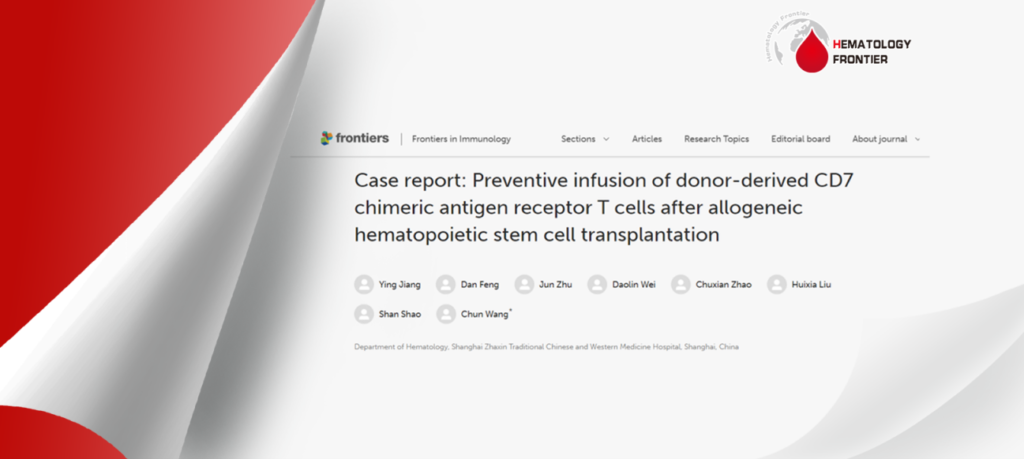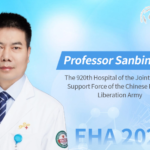
Recent clinical studies have shown that CD7-targeted chimeric antigen receptor T-cell (CAR-T) therapy is effective and safe for patients with T-cell acute lymphoblastic leukemia/lymphoma (T-ALL/LBL). Combining CAR-T therapy with transplantation has the potential to enhance treatment efficacy and reduce disease recurrence. Most existing studies have implemented CD7 CAR-T cells as a bridge to allogeneic hematopoietic stem cell transplantation (allo-HSCT). Recently, Professor Chun Wang’s team at Shanghai Zhaxin Traditional Chinese and Western Medicine Hospital successfully applied a new approach: post-allo-HSCT infusion of donor-derived CD7 CAR-T cells to treat a case of refractory T-ALL/LBL. This study, published in Frontiers in Immunology, offers new strategies for treating R/R T-ALL/LBL patients. We conducted an exclusive interview with the study's first author, Professor Ying Jiang, to provide a deeper understanding of this research.Case Summary
At age 13, the patient presented with persistent cough, chest tightness, and abdominal pain for 10 days. A CT scan at another hospital revealed a mass in the anterior mediastinum and left liver lobe (maximum size: 136 mm x 127 mm x 84 mm), along with pericardial and right pleural effusion. Pathological examination following the surgical removal of the mediastinal tumor confirmed T-ALL/LBL. The tumor expressed CD10, CD3, and CD7, and partially expressed Ki-67, CD79a, CD99, Bcl6, Bcl2, TdT, CD1a, and CD38. Bone marrow aspiration results were negative.
Over the 18 months preceding HSCT, the patient received 11 cycles of chemotherapy, including VDLP, CAM, HR1/2/3, and VDL regimens, and multiple intrathecal injections. PET/CT evaluations at 15 and 3 months before HSCT showed partial remission (PR) and disease progression (PD), respectively.
The patient came to our hospital with a plan for autologous CD7 CAR-T cell therapy. However, due to the failure of autologous CD7 CAR-T cell preparation following lymphocyte collection and lymphodepletion, the treatment plan was adjusted. The patient subsequently underwent allo-HSCT and prophylactic infusion of donor-derived CD7 CAR-T cells.
The patient received haploidentical stem cells from their sister (HLA 7/12, donor blood type A Rh+, recipient blood type O Rh+, CD34+ cell count 13.03 x 10^6/kg). The conditioning regimen included TBI, VP-16, CTX, and ATG, with GVHD prevention using tacrolimus and methotrexate. Neutrophil and platelet engraftment occurred on days +14 and +12, respectively. Bone marrow on day +14 showed complete donor chimerism. PET/CT at 2 months post-HSCT indicated complete remission (CR).
Study Insights
Oncology Frontier – Hematology Frontier: As we know, R/R T-ALL/LBL patients generally have poor prognosis. Could you discuss the main challenges in diagnosis and treatment in this field?
Professor Ying Jiang: T-ALL/LBL is an aggressive and rapidly progressing hematologic malignancy caused by the malignant proliferation of immature T cells. Currently, only 20% to 40% of T-ALL/LBL patients can achieve remission with multi-drug chemotherapy. Allo-HSCT is recommended for patients achieving complete remission (CR); however, the response rate to various salvage chemotherapy regimens is low for those not reaching CR.
Overall, the survival rate for R/R T-ALL/LBL patients is below 10%. Many patients in this group are young and highly motivated to seek treatment. Thus, improving treatment outcomes for this group is a significant clinical challenge.
Oncology Frontier – Hematology Frontier: Unlike most clinical explorations where CAR-T therapy is used as a bridge to transplantation, this case involved allo-HSCT followed by donor-derived CD7 CAR-T cell therapy. What were the considerations behind this approach?
Professor Ying Jiang: This patient underwent 11 cycles of chemotherapy, yet new lesions emerged, indicating disease progression. We initially considered autologous CAR-T therapy, but the poor quality of the patient’s lymphocytes after multiple rounds of chemotherapy led to the failure of autologous CD7 CAR-T cell preparation.
Clinical explorations involving donor-derived CD7 CAR-T cells as a bridge to allo-HSCT have shown that CD7 CAR-T cells rarely persist post-transplant. In clinical trials without bridging allo-HSCT, CD7 CAR-T cells demonstrated prolonged persistence post-infusion. Based on this, we aimed to achieve remission through allo-HSCT and then perform prophylactic infusion of the same donor-derived CD7 CAR-T cells, hoping for long-term disease-free survival.
Oncology Frontier – Hematology Frontier: How effective was this treatment approach overall? What trends did you observe in the levels of CD7+ and CD7- T cells in peripheral blood lymphocyte reconstitution?
Professor Ying Jiang: This patient achieved CR by PET/CT evaluation at 2 months post-HSCT. The combined strategy of transplantation and CAR-T therapy led to long-term remission (over 20 months), whereas median PFS for patients receiving only CD7 CAR-T therapy is 11 months, and median OS for those relapsing post-transplant is only 6.2 months.
In terms of safety, with appropriate immunosuppressive therapy, the patient only experienced mild infection, GVHD, and grade 1 cytokine release syndrome (CRS).
During peripheral blood lymphocyte reconstitution post-CD7 CAR-T cell infusion, we observed that CD7+ T cell levels dropped to zero by day +17, while CD7- T cells began to proliferate. This trend is consistent with findings from other studies, where expanded CD7- T cells maintained the patient’s cellular immune function. Additionally, some researchers have suggested that donor hematopoietic stem cells can successfully differentiate into CD7- T cells, retaining antiviral capacity and reducing allogeneic responses, thus resulting in a lower incidence of GVHD.
Oncology Frontier – Hematology Frontier: What implications does this case’s successful treatment have for managing R/R T-ALL/LBL?
Professor Ying Jiang: The treatment strategy used in this case involved rebuilding the patient’s immune and hematopoietic functions through allo-HSCT, followed by CAR-T cell infusion for long-term surveillance. This approach achieved a breakthrough long-term remission in an R/R T-ALL/LBL patient. For similar cases, this successful experience can be referenced to provide patients with more treatment options.
Expert Profiles
Chun Wang
- Chief Physician, Professor, PhD Supervisor
- Medical Director of Shanghai Zhaxin/Liquan Hospital, Gaobo Medical Group
- Former Director of Hematology at Shanghai First People’s Hospital, PhD Supervisor at Shanghai Jiaotong University Affiliated First People’s Hospital.
- Specializes in hematopoietic stem cell transplantation and infection prevention in hematology.
- Positions held: Chair of the 9th Hematology Committee of the Shanghai Medical Association; Vice-Chair of the Infection and Chemotherapy Professional Committee of the Shanghai Medical Association; Vice-President of the Hematology Specialty Committee of the Shanghai Medical Doctor Association; Member of the Bacteria and Drug Resistance Prevention Committee of the Chinese Medical Association; Secretary-General and Deputy Leader of the Infection Group of the 8th Hematology Committee of the Chinese Medical Association; Standing Member of the Hematological Oncology Professional Committee of the Chinese Anti-Cancer Association; Member of the Hematology Specialty Committee of the Chinese Medical Doctor Association.
- Published over 100 professional papers in domestic and international journals, including 25 in SCI journals. Interviewed by The Lancet Oncology in 2001. Published research on mechanisms of anti-thymocyte globulin-induced leukemia cell killing, high-dose etoposide in stem cell mobilization, hematopoietic stem cell transplantation for T-cell lymphoma, post-transplant immunosuppressant adjustment strategies, donor-recipient chimerism monitoring post-allo-HSCT, and GVHD monitoring in top SCI journals such as Clinical Infectious Diseases, Journal of Clinical Oncology, and Blood Cancer Journal.
- Expertise: Diagnosis and treatment of relapsed/refractory leukemia, adult and elderly transplants, lymphoma, multiple myeloma, severe aplastic anemia, and other malignancies.
Ying Jiang
- Associate Chief Physician, MD
- Medical Team Leader at Shanghai Zhaxin Hospital, Gaobo Medical Group
- Former attending physician in the Hematology Department at Shanghai First People’s Hospital, obtained MD from Shanghai Jiaotong University School of Medicine.
- 22 years of experience in diagnosing and treating hematologic diseases. Visiting scholar at the Mayo Clinic Immunology Lab in 2014. Participated in multiple municipal and national scientific research projects. Major research achievements include individualized MRD monitoring and treatment post-hematopoietic stem cell transplantation, and immunotherapy for hematologic tumors.
- Awards: National Second Prize in Science and Technology Progress by the Chinese Medical Association (2017), Third Prize in Shanghai Medical Science and Technology Awards (2016), Third Prize in Shanghai Medical Science Progress Awards (2008).
- Expertise: Diagnosis and treatment of malignant hematologic diseases, CAR-T therapy, and transplantation treatment, focusing on immunotherapy research.


